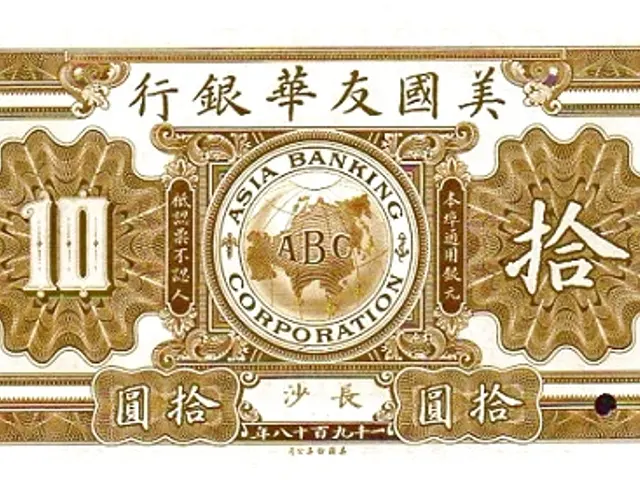Smoothing Over Tensions: Merz and Trump Seek Swift Resolution to Trade Disputes and Ukraine Crisis
Initiated call: Merz and Trump aim for swift resolution in trade disagreement
Facebook ⚬ Twitter ⚬ Whatsapp ⚬ E-Mail ⚬ Print ⚬ Copy Link
In the wake of his swearing-in, Chancellor Merz shared a cordial conversation with US President Trump, with both leaders expressing a commitment to resolving the trade dispute and fostering peace in Ukraine.
Early signals of de-escalation in the trade conflict, cooperation intentions regarding Ukraine, and mutual invitations to Germany and the US—these are the notable outcomes of the inaugural chat between Germany’s freshly-minted Chancellor Friedrich Merz and the US President. The exchange was reportedly "unexpectedly positive, relaxed, and courteous" according to official insiders.
The call took place Thursday evening, just two days following Merz's election and installation in the Bundestag. Trump extended his congratulations, as per German reports. Merz reaffirmed the US's position as an indispensable ally and partner for Germany, particularly on the 80th anniversary of the end of World War II.
The majority of the 30-minute discussion focused on Ukraine. Both leaders agreed on collaborative efforts to end the ongoing Russian aggression, with Stefan Kornelius, the government spokesperson, elaborating on Merz and Trump's shared desire for an expeditious cessation of hostilities in Ukraine. Russia must now convene a truce to create favorable conditions for negotiations, as demands by the U.S. and Germany alike. Trump vowed to support German efforts “vigorously,” signing agreements with France, Britain, Poland, and other European partners to foster lasting peace.
Resolving Trade Disputes
The second topic under discussion was the trade dispute between the U.S. and the EU. Both Merz and Trump consented to swiftly resolve the contention between the U.S. and the EU; however, a resolution remains elusive. Before the conversation, the EU Commission announced plans to impose supplementary tariffs on American exports valued at up to $95 billion, in the event that negotiations with Washington do not result in a solution.
A 90-day deadline set by Trump for EU concessions expires in July. Should negotiation efforts fail, Trump plans to impose extensive additional tariffs on EU imports, in addition to existing tariffs.
Previously, Merz dismissed criticisms from the U.S. administration regarding the Federal Office for the Protection of the Constitution's classification of the AfD as "undoubtedly right-wing extremist." Concurrently, he advocated for the removal of all tariffs by the EU and the U.S., expressing his desire to avoid escalating into an open trade war. He also championed a significant expansion of mutual recognition of technological standards.
Collaborative Invitations
Prior to this conversation, Merz and Trump were virtually strangers, having only casually met in New York many years ago. According to official German government sources, Merz extended an invitation to Trump, highlighting the President's German heritage and knowledge of Kallstadt, a town on the German Wine Route in Rhineland-Palatinate, where Trump's grandparents hailed from prior to their emigration to New York at the turn of the 19th century.
Trump indicated a potential visit to Germany, having only attended the G20 summit in Germany in 2017 (excluding brief pit-stops at the Ramstein airbase). Merz, in turn, invited Trump to Washington. The Chancellor has publicly declared his intention to travel to the U.S. prior to the G7 and NATO summits in June, a timeframe within the next six weeks. The G7 summit is scheduled to take place in Canada in mid-June, followed by the NATO summit in The Hague.
Enrichment Data:
As of the most recent developments, the trade conflict between the U.S. and the EU shows no sign of conclusive resolution, with negotiations seemingly at an impasse. Here is a summary of the current situation and Germany's potential role:
Current Status of the Trade Dispute:
- EU Countermeasures: The European Union has proposed tariffs on nearly €93.4 billion worth of American imports, including aircraft and passenger cars, in response to recent US tariffs. This move is intended to pressure the US into negotiation, as ongoing talks have yet to yield a resolution[1][3][4].
- WTO Litigation: The EU plans to challenge US tariffs at the World Trade Organization (WTO) by requesting consultations. This move aims to address the legality of US-imposed tariffs under international trade rules[1][2].
- Public Feedback: The EU is actively seeking public feedback on its proposed countermeasures, which could be imposed if negotiations do not yield an agreement[2].
Germany's Role: While there is no specific information regarding Chancellor Friedrich Merz's contribution to resolving the trade dispute following his phone call with US President Donald Trump, Germany, as a key EU member, plays a significant role in shaping EU trade policies. Given its substantial exports to the US, Germany's economic interests are closely tied to the outcome of these negotiations. Germany's role could involve supporting EU-wide efforts to negotiate with the US, leveraging its economic influence to push for a mutually acceptable resolution benefitting both parties. However, without direct involvement in specific talks or statements from Chancellor Merz, Germany's precise role remains speculative.
Overall, the situation remains precarious, with both sides engaged in an escalating trade war that could deepen unless negotiations produce a mutually satisfactory agreement.
- Despite the ongoing economic and monetary union (EMU) tensions between the US and EU, Chancellor Merz and President Trump expressed a commitment to resolving the trade dispute swiftly during their conversation.
- The leaders acknowledged the importance of collaborative efforts to end the ongoing Russian aggression in Ukraine as part of their discussion on monetary union and politics.
- In the midst of trade disputes and war-and-conflicts, Chancellor Merz extended an invitation to President Trump, highlighting his German heritage and family roots in Kallstadt, inviting him to visit Germany.
- Although Merz and Trump assessed the Ukraine crisis and trade disputes, they were unable to achieve a resolution during their conversation, leaving the potential for further policy-and-legislation and general-news developments.
- As Germany's Chancellor, Merz plays a significant role in shaping EU trade policies and economic affairs, particularly in the context of monetary union with the US, and will likely continue to be involved in efforts to resolve trade disputes and promote peace in Ukraine.








